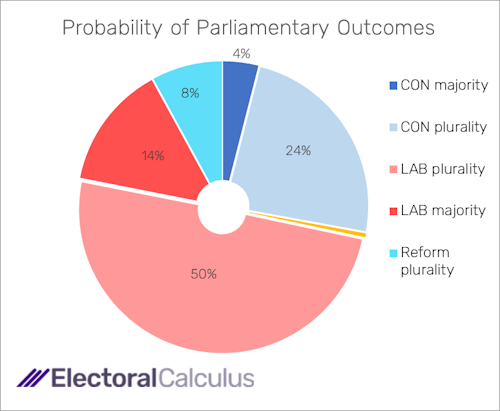When opinion polls show Labour and Conservatives tied for votes, the question of who forms the government will not be decided by the flip of a coin or by an agreement to rotate control of Downing Street. It will be decided by what Britain's multiple third parties decide to do.
The current poll prediction shows the Liberal Democrats finishing third with 68 seats. When this is combined with Labour's predicted 285 seats a Labour-Lib Dem coalition could govern with an absolute majority of 353 of the 650 seats in the House of Commons.

If Labour's vote fell from the current level it could still lead an absolute-majority coalition as long as it won 258 MPs. This assumes that the Liberal Democrats would want to join up with a party that lost more than 150 seats. The Liberal Democrat alternative would be to support a minority Labour government long enough for Labour's popularity to drop further and the Lib Dems to develop a strategy to win more seats in an early election.
The Liberal Democrat hold on more than a tenth of MPs is secure as long as the Conservatives do not de-toxify their electoral appeal by shifting to the centre as David Cameron successfully did. Kemi Badenoch has shown no evidence of doing that.
As the Conservatives demonstrated in July, there is no limit to the seats a governing party can lose once its support begins to fall. Electoral Calculus reckons there is a one in ten chance that Labour would require a three-party support to have a majority.
Even though arithmetic could produce a three-party coalition, politics would veto it. Depending on how many seats Labour lost, a majority would require support by 16 or more Scottish Nationalist MPs or support by Nigel Farage's Reform Party.
There is currently a better than one-in-three chance that Labour would fail to win the most MPs. In that case, both arithmetic and politics create obstacles to forming a government. A long-shot Conservative recovery would leave it 14 seats of a majority. Even if Reform continues to gain support it does not gain seats in proportion to votes, because its vote is widespread across constituencies. Thus, there is little more than a one in ten chance of it winning more than 200 MPs.
Prof Richard Rose, University of Strathclyde, is Britain's senior election expert. He has been writing about elections at home and abroad for well over half a century.